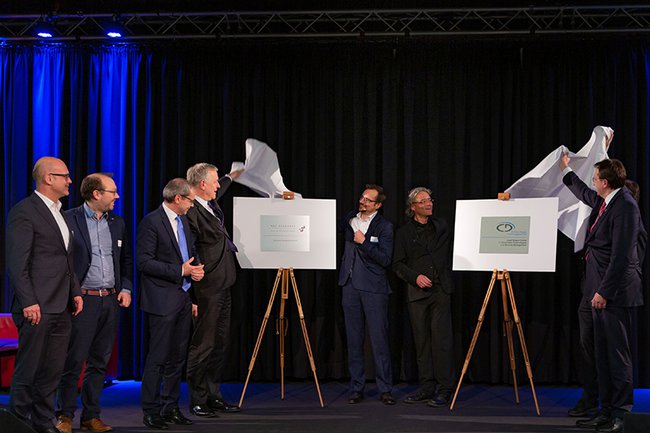Blockchains for Research, Business and Culture
Report on the Blockchain Summit at the St. Pölten UAS

The Blockchain technology is one of the most important drivers of innovation in digital change today. Two of the most important Blockchain centres in Austria pursue their research and development at the St. Pölten University of Applied Sciences: the Austrian Blockchain Centre (ABC) and the Josef Ressel Centre for Blockchain Technologies & Security Management.
This week, both centres were presented at a Blockchain Summit at the St. Pölten University of Applied Sciences and the ABC location in Lower Austria was opened. Experts from the field provided an insight into the application of Blockchain technology in companies and cultural institutions and reported on current research results.
Integration into the Practice of Existing IT
At the Blockchain Summit at the St. Pölten UAS, lectures by experts, especially for interested companies, presented an overview of the possibilities of Blockchains.
Andreas Petersson of Capacity Blockchain Solutions gave the keynote speech with an overview of current Blockchain applications: the technology is there, but not yet usable for many end users. An example from the practical realm is the digital stamp based on Blockchain technology which was introduced by the Austrian postal service last year. According to Petersson, however, the new Blockchain technology should be connected even more strongly with existing traditional IT systems.
Blockchain in the Opera
A series of lectures focused on aspects of IT security in the context of Blockchains. Workshops gave company representatives an insight into how Blockchains can be used in practice. The Lower Austrian site of the Austrian Blockchain Centre (ABC), which is located at the St. Pölten University of Applied Sciences, was opened within the framework of an evening event.
Experts from research and practice were invited to a panel discussion. Among others, Christopher Widauer, Head of Digital Development at the Vienna State Opera, presented approaches to digitalisation and the use of Blockchain technology in the State Opera: in recent years, the Opera has introduced live streaming and TV production services, offers so-called smart seats with 2,100 tablets in the seats which allows it to address visitors individually and has switched to digital sheet music. For the latter, Blockchain and smart contracts will be used to manage licences and copyrights.
Blockchain Competency at the St. Pölten UAS
Two of the most important Blockchain centres in Austria conduct research and development at the St. Pölten University of Applied Sciences: the Austrian Blockchain Centre (ABC) and the Josef Ressel Centre for Blockchain Technologies & Security Management.
“In recent years, the St. Pölten University of Applied Sciences has developed research focuses in several areas of digital change and computer science. This enables us to identify future developments at an early stage and, as far as possible, build up expertise on relevant future technologies. Since we have been particularly successful in this endeavour as far as Blockchain is concerned, we also play a relevant role in collaborations with large universities and important companies and set the appropriate priorities”, explains Hannes Raffaseder, Chief Research and Innovation Officer of the St. Pölten University of Applied Sciences.
Secure Blockchains for the Industry – Two New Research Centres
The Austrian Blockchain Centre (ABC), headed by the Vienna University of Economics and Business, is dedicated to the scientifically sound further development of the technology and its application in various economic sectors. The St. Pölten University of Applied Sciences manages one area out of five on the topic of “Emerging Industries & Blockchain in Industry 4.0”.
“The Austrian Blockchain Centre combines cutting-edge research in Austria on Blockchain with a unique consortium. The St. Pölten University of Applied Sciences will contribute its expertise, for example, in areas such as semantics”, says Franz Fidler, Deputy Head of the Department Media and Digital Technologies at the St. Pölten University of Applied Sciences.
In the Josef Ressel Centre for Blockchain Technologies & Security Management, the St. Pölten University of Applied Sciences, in collaboration with the companies SEC Consult, Capacity Blockchain Solutions and CPB Software (Austria), researches aspects of IT security regarding the use of Blockchains, develops new fields of application for the technology and advises companies on its introduction.
“With their high level of protection against forgery, Blockchains enable the design of highly decentralised systems. This means that data are distributed across many computers and are not centrally managed by anyone. With the new centre, we can improve the basics behind this, increase the security of the systems and support companies in their use”, explains Peter Kieseberg, Head of the Institute for IT Security Research at the St. Pölten University of Applied Sciences and the Josef Ressel Centre.
The Blockchain Summit was carried out in cooperation with the Digital Innovation Hub DIHOST and its partners and supported by the SMARTUP initiative.
Radio Broadcast on the Topic (in German):
Franz Fidler, Peter Kieseberg and Thomas Moser, the heads of the centres, were recently invited to join a "Campus Talk" at Campus & City Radio 94.4. in order to report on their work.

FH-Prof. Dipl.-Ing. Dr. Franz Fidler
Head of Faculty of Engineering and Business Academic Director Digital Design (MA) Academic Director Digital Media Management (MA) Academic Director Digital Media Production (MA) Academic Director Interactive Technologies (MA) Member Extended University Leadership Course Leader Digital Future Management (certif.) Department of Media and Digital Technologies